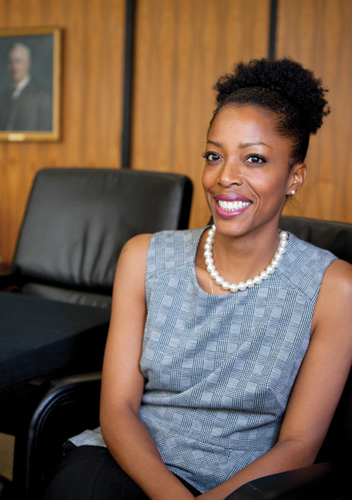An investment manager speaks on behalf of the workers.
“I manage $7 billion. That’s all I do.”
On the 14th floor of the Standard building, Rukaiyah Adams is explaining the fundamentals of her job as director of investment management for the Portland-based financial services group.
The 39-year-old started working at the Standard in 2012 and this past spring was appointed to the Oregon Investment Council, where Adams helps invest $100 billion in Oregon state funds.
“I only play with the Bs,” she laughs.
A Portland native, Adams earned an M.B.A and J.D. from Stanford. Before joining the Standard, she was chief operating officer and director of investments at IAM Asset Management in New York City.
In her current position, she manages a team that oversees the assets backing the company’s insurance claims, retirement plan payouts and trust funds.
On a recent Thursday afternoon in her office, where security is so tight there’s no signage on the door — “the security is nobody knows about us” — Adams talked about the business of risk management and asset classes such as railcars and cell-phone towers.
She also advanced a wide-ranging theory of 21st-century demographic changes and seismic shifts in investment patterns.
Indeed, if Adams is a woman to watch, it’s not just because she comes across as a visionary thinker — it’s because as a young, black, female investment manager, she distills the essence of the social, political and economic changes and challenges sweeping the country.
“Historically, we had females who stayed at home, males who earned and had pensions and a house that is worth something,” says Adams. But that model is being disrupted. As a single woman, “I don’t have a paternal force protecting me,” she says.
And as pensions disappear and individuals take on the burden of retirement saving, the average worker will “imprint their values” on the investments, companies and private-equity shops that return money to them.
The big picture question informing those values, says Adams, is “are we using our retirement plans to create an unsustainable economic system?”
Dressed in an elegant black pantsuit, Adams hardly looks the part of a “middle-aged spinster,” as she describes herself.
Much of her colorful life story seems tailor made for a biopic.
In the ninth grade, Adams, the daughter of a single mother, was part of an experiment transferring a cohort of eight minority students from Harriet Tubman Middle School in North Portland to Catlin Gabel, an elite private school.
“It was a difficult transition to go from a largely black environment and all the social cues in that environment to the orthogonal power system,” Adams recalls. “But I’m thankful I made that transition young.”
On presidential election night in 2008, Adams, who practiced law for seven years before joining IAM, joined attorneys around the country monitoring polls in battleground states — and ended up, ironically, in a suburban Republican precinct in Ohio helping voters “who were voting against who I wanted them to vote for.”
But the experience left her feeling powerful. “People who didn’t want my help took it, and it felt so good.”
Today Adams describes herself as the “average person’s homegirl in the capital markets.” At the Standard, her job isn’t “to make rich people richer,” says Adams, noting she returned to Portland in 2011 to help her mother, a Northwest Natural customer-service representative, ease into retirement.
“I’m here to deliver disability payments or retirement funds when they are needed.”
Practically speaking, Adams’ job involves buying bonds, preferred stock, asset-backed securities and timber futures — “anything where there is a cash flow.” Cut through the jargon, she says, “and what we really are is lenders.”
For example, the StanCorp team might loan money to a company that manages a fleet of railcars, in which the collateral for the loan is the railcar and the cash flow is the interest on the loan. The challenge of the job, Adams says, involves “understanding who we’re lending to, why our analysis might fail and how much we get back if we misunderstood the credit risk.”
That’s the technical side of the business. But Adams, who at times sounds more like a left-leaning political theorist than a multi-billion-dollar asset manager, is also motivated by other imperatives.
Her generation, she says, “is squished between two monster generations: overconsumers and wasters and underemployed people.” Her goal is to figure out what these changing demographics and savings patterns mean to the people she represents and how to translate these changes to her behavior in the market.
“Can I take money from a teacher, then put it in a private-equity fund that puts the squeeze on the grocery-store worker?” Adams asks.
The traditional answer has been: “Our job is to return your money. But I don’t think that framework is informed today. And I always want to tell people, ‘Don’t occupy Wall Street. Occupy your 401(k) because that’s where your power is being used to create externalities you don’t like.’”
This month, Adams is celebrating her 40th birthday by giving herself flying lessons and raising $40,000 for women’s and girls’ organizations. There are a lot of women in the workplace — a lot of black women in the workplace, she says.
“The next step is for us to take command.” Her long-term goal is to build a leading financial-services company based in the Pacific Northwest.
“The states with natural resources are where the action will be for my generation,” says Adams, offering up another prediction. “New York and San Francisco do transactional stuff; it’s not real. But the trees and water and wind here will be the basis for real power, authority and leadership.”
At the Standard and on the Oregon Investment Council, Adams’ job is pragmatic: “My fiduciary responsibility is to take the money and deliver more,” she says. “But I have a theory: I think we are underappreciating the sea changes that are coming.”
Correction appended:
The article about Rukaiyah Adams, director of investor management at the Standard, misstated her title as a “voter-rights lawyer” for the 2008 presidential election. Adams was a mergers and acquisitions lawyer who did pro bono work on voter rights campaigns, one of which was organized through Counsel for Change in the 2008 Presidential Election.



